Ready to level up your learning game? Whether you’re chasing career growth, mastering a new skill, or just curious to explore something new the right online platform can make all the difference.
In this guide, we’ll walk you through the 5+ best Coursera alternatives of 2026 that are flexible, affordable, and built for real results.
Let’s find out which one fits you best!
Introduction

While Coursera is a well-known platform for online learning, there are many reasons you might seek alternatives.
Whether it’s a broader course selection, flexible pricing, or a different learning style, other platforms offer unique benefits.
This article explores five top Coursera alternatives, from Udemy’s affordable, extensive courses to edX’s academic rigor and Skillshare’s creative, project-based learning. We’ll compare pricing, features, and course offerings to help you find the best fit.
Why Look for the Best Coursera Alternatives?
Before diving into the alternatives, let’s explore why you might want to look beyond Coursera. Coursera has some limitations that may not meet everyone’s learning needs.
- Pricing:
Coursera’s subscription and course fees can be high, and while financial aid is available, some prefer more flexible payment options. - Narrow Focus:
Coursera’s focus on university-backed certifications might not be ideal for those seeking niche topics or hands-on learning. - Course Variety:
Known for academic courses, Coursera may lack practical, industry-focused, or creative subjects that some learners want. - Learning Style:
Coursera’s primarily video-based format may not appeal to those seeking more interactive or community-driven learning experiences. - Certification Value:
While Coursera certificates come from top institutions, other platforms may offer certifications better aligned with specific career goals.
5+ Best Coursera Alternatives 2025
1. Udemy: A Massive, Affordable Learning Library
Introduction:

Udemy has established itself as a titan in the world of online learning. With over 150,000 courses, Udemy caters to learners from all walks of life.
The platform is particularly known for its affordable pricing and extensive variety. Unlike Coursera, which primarily focuses on university-backed courses, Udemy allows independent instructors to create and offer courses, making it a great choice for learners seeking specialized skills or niche topics.
Whether you’re looking to learn tech, marketing, business, or creative fields, Udemy likely has a course for you.
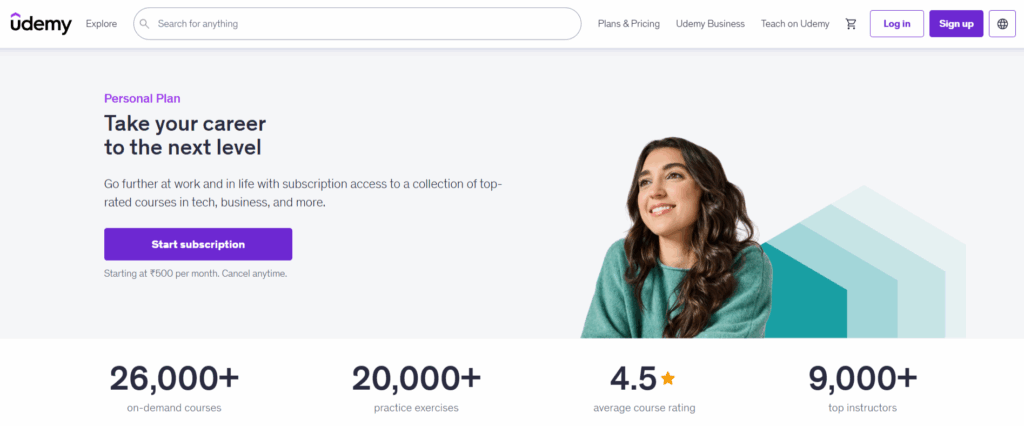
Features:
- Huge Course Library:
Over 150,000 courses across a wide variety of subjects, including technology, business, health, marketing, personal development, and more. - Affordable Pricing:
Courses typically range from $10 to $200, with frequent discounts and flash sales. Many popular courses are offered for as low as $10 during sales events. - Lifetime Access:
Once you purchase a course, you get lifetime access. This is especially useful for revisiting content as you progress in your learning. - Wide Variety of Topics:
Whether you want to learn coding, photography, or even music production, Udemy’s extensive library makes it possible.
Pricing:
1. Personal Plan
- Cost: $35/month or $240/year
- Access: 13,000+ courses
- Features: Coding exercises, quizzes, certificates
- Trial: 7-day free trial
2. Team Plan
- Cost: €28/month per user (billed annually)
- Access: 13,000+ courses
- Features: Certification prep, analytics, AI coding exercises
- Trial: Free trial available
- The Enterprise Plan of Udemy requires you to contact them for pricing. It provides access to over 30,000 courses and includes features such as advanced analytics, customizable content, and AI-powered exercises. A free demo is also available for organizations interested in exploring the platform.

Udemy Pros and Cons
| Pros | Cons |
|---|---|
| Affordable courses with frequent discounts | Course quality can vary widely |
| Huge library (210K+ courses) across many topics | No official accreditation |
| Lifetime access to purchased courses | Limited instructor support |
| Great for beginners and self-learners | No structured learning path |
| Regular sales make learning budget-friendly | Certificates hold low industry value |
2. edX: University-Backed, Rigorous Learning
Introduction:
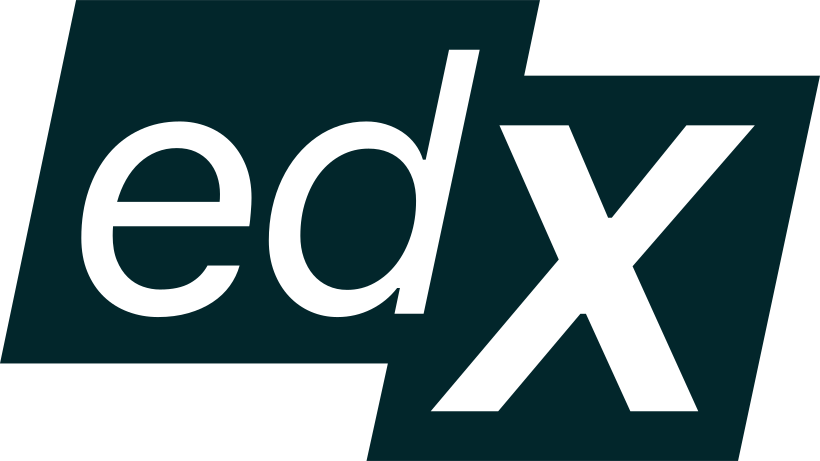
If you’re looking for more academic rigor and certifications that carry weight in the academic and professional worlds, edX is a fantastic alternative. Founded by Harvard and MIT, edX offers high-quality online courses, certifications, and degree programs from top universities.
Whether you’re looking to gain professional development or pursue a micro-degree, edX brings rigorous academic learning right to your fingertips.
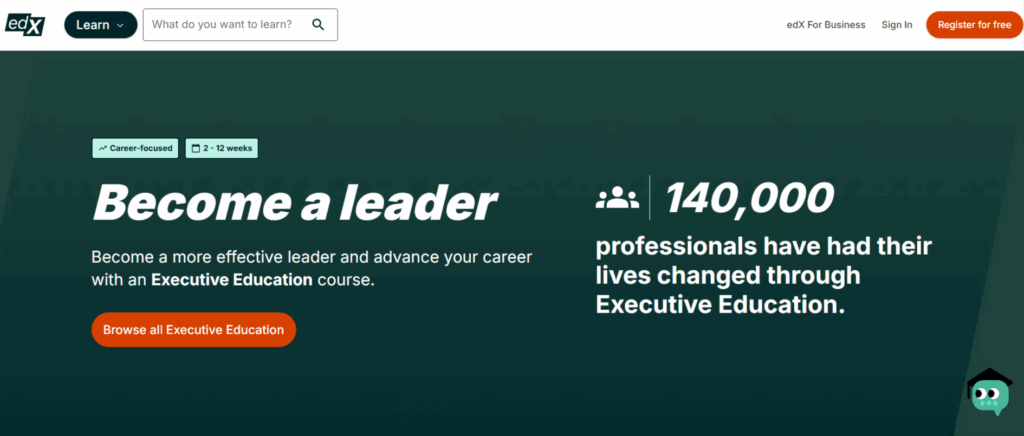
Features:
- University Partnerships:
edX is partnered with top universities like Harvard, MIT, Berkeley, and Columbia, offering high-quality, university-backed courses. - MicroMasters Programs:
These programs allow you to earn a credential that may contribute toward a master’s degree. - Free Audit Options:
Most courses offer the option to audit for free, but you can pay for a certificate. - Professional Certification:
edX offers industry-specific certifications that are highly regarded in the workforce.
Pricing:
1. Teams Plan
- Cost: Starts at $33 per user per month, billed annually
- Access: 2,300+ self-paced courses and 300+ professional certificates
- Features: Includes 8 academies, course assignments, progress tracking, and analytics
- Best For: Small to medium-sized teams (up to 50 learners)
- Trial: Free trial available
2. Enterprise Plan
- Trial: Free demo available
- Cost: Contact edX for pricing (custom quote)
- Access: Full edX course library and all professional certificates
- Best For: Large organizations (50+ learners)

edX Pros and Cons
| Pros | Cons |
|---|---|
| University-backed courses from MIT, Harvard, etc. | Certificates can be expensive |
| Offers professional micro-degrees | Some courses are time-limited |
| High academic credibility | Interface feels formal, less creative |
| Free to audit most courses | Limited hands-on practice |
| Recognized by employers | Fewer creative or casual learning options |
3. Udacity: Advanced Learning for the Tech-Savvy
Introduction:

Udacity is a platform designed for learners looking for industry-specific skills, particularly in the fields of data science, artificial intelligence, and programming.
It’s a perfect choice for learners who want to build job-ready skills and earn certifications that are recognized by top tech companies. With its nanodegree programs, Udacity focuses on offering comprehensive, project-based learning that is tailored to the needs of the tech industry.
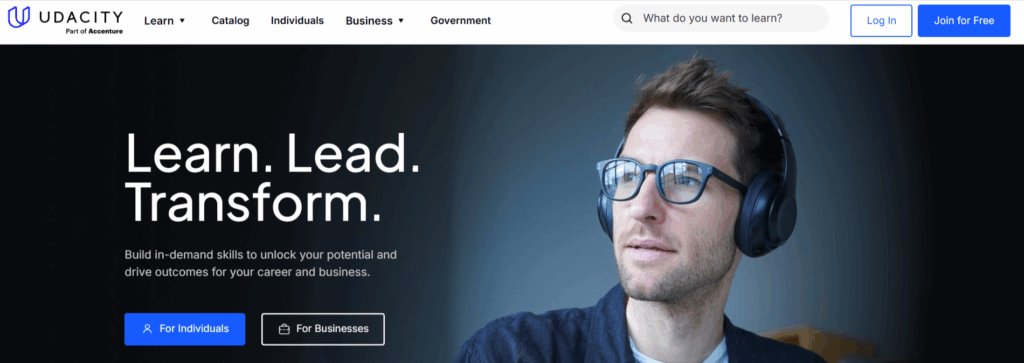
Features:
- Industry-Recognized Certifications:
Courses designed in collaboration with companies like Google, IBM, and Amazon. - Nanodegrees:
Special programs aimed at helping students acquire specific skills, such as Data Science, AI, or Programming, with personalized feedback and support. - Project-Based Learning:
Focus on practical, hands-on learning with real-world projects. - Career Services:
Udacity offers career coaching, resume reviews, and job search support.
Pricing:
- Nanodegree programs typically cost around $399 per month, with some programs lasting from 4 to 12 months.
- Offers financial support for learners in need.
Udacity Pros and Cons
| Pros | Cons |
|---|---|
| Job-ready “Nanodegree” programs | Costly compared to competitors |
| Strong focus on tech and data careers | Limited non-technical subjects |
| Excellent mentorship and project reviews | Requires strong time commitment |
| Partnerships with top companies | Short free content availability |
| Great for career changers | Less community interaction |
4. Skillshare: The Creative Learner’s Hub
Introduction:

Skillshare is a standout platform for those interested in creative subjects like graphic design, photography, writing, and video production.
Unlike traditional online learning platforms, Skillshare emphasizes project-based learning, encouraging students to create tangible work during the course. It’s perfect for those who prefer learning by doing, and its community-oriented environment fosters creativity and collaboration.
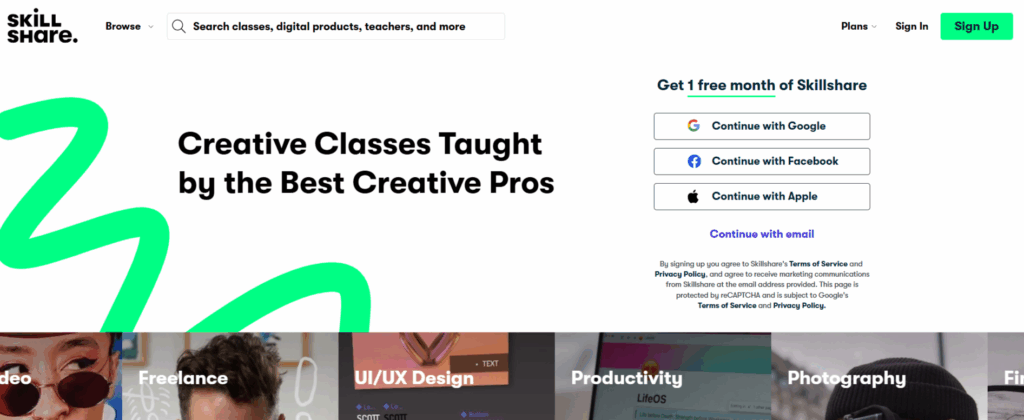
Features:
- Project-Based Learning:
Each course includes a hands-on project, allowing learners to apply what they’ve learned in a real-world context. - Creative Fields Focus:
Strong emphasis on creative industries like art, writing, design, photography, and entrepreneurship. - Community Interaction:
A strong community of learners who share projects, give feedback, and collaborate. - Instructor Accessibility:
Many instructors actively engage with students, offering advice and feedback.
Pricing:

- The Skillshare individual plan is priced at $13.99 per month, billed annually as a one-time payment of $167.88 USD. This plan gives users unlimited access to all Skillshare classes, allowing them to learn at their own pace and explore creative skills across design, photography, writing, business, and more.
- 7-day free trial available.
Skillshare Pros and Cons
| Pros | Cons |
|---|---|
| Unlimited access with subscription | No lifetime access to courses |
| Great for creative and practical skills | Lacks formal certification |
| Community-based learning | Some classes feel repetitive |
| Project-based approach | Limited advanced professional content |
| Short, engaging video lessons | Offline access only via mobile app |
5. DataCamp: Focused Learning for Data Science
Introduction:

DataCamp offers a data science and analytics-focused learning platform that is perfect for those who want to dive deep into data analysis, machine learning, and data visualization.
Unlike Coursera, which provides a broad range of courses, DataCamp is laser-focused on the data science field, offering specialized learning paths for people looking to make careers in tech.
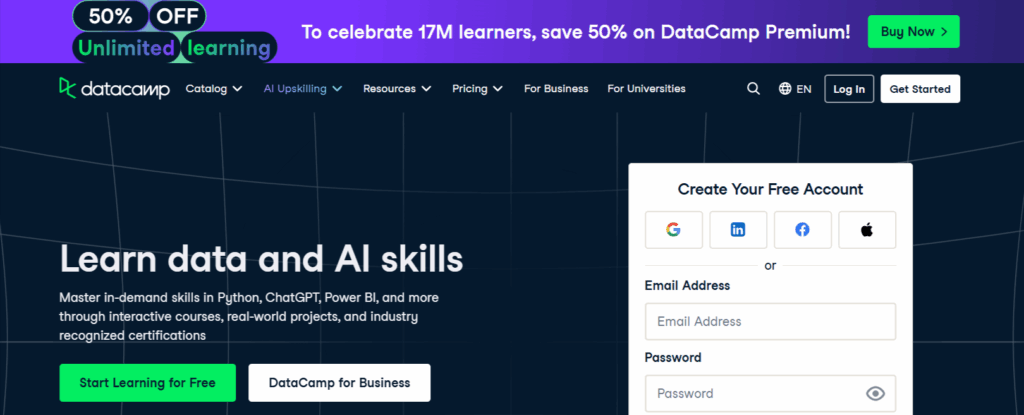
Features:
- Interactive Coding Challenges:
Learn by doing with hands-on coding exercises that help you build practical data science skills. - Specialized Data Science Tracks:
DataCamp offers career tracks in Data Science, Data Engineering, and Machine Learning, ensuring focused learning paths. - Real-World Projects:
Work on real-world datasets and apply your learning to industry-standard problems. - Skill Assessments:
Assess your current skills and measure progress throughout the course.
Pricing:
1. Basic Plan (Free)
- Cost: Free
- Access: First chapter of every course
- Features: Free profile, limited content, no certificates
2. Premium Plan (Individuals)
- Cost: $14/month, billed annually
- Access: 2,300+ full courses and skill tracks
- Features: Projects, certificates, and coding practice in Python, SQL, R, Tableau, etc.
3. Teams Plan
- Features: Progress tracking, group management, and business integration tools
- Cost: $14 per user/month, billed annually
- Access: Everything in Premium plus team analytics
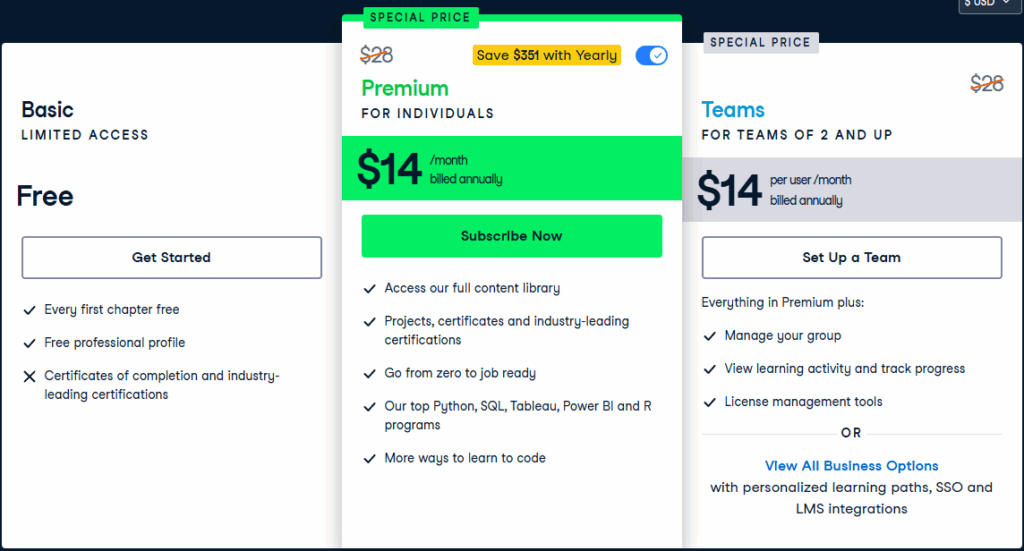
Description:
- $25/month for basic access to courses.
- $33.25/month for the premium plan with more features and content.
- Discounts available for annual subscriptions.
DataCamp Pros and Cons
| Pros | Cons |
|---|---|
| Specializes in data science & analytics | Focus limited to data-related fields |
| Interactive coding in browser | No instructor-led support |
| Skill tracks and career paths available | Lacks deep theory for advanced users |
| Affordable annual pricing | Certificates have limited recognition |
| Great for beginners to mid-level learners | Courses can feel short or basic |

Coursera vs. Alternatives (Quick Comparison Table)
When comparing learning platforms, it’s helpful to have a quick reference that shows key differences. This table provides a comparison of Coursera with popular alternatives across various factors like course offerings, pricing, and certifications.
| Feature | Coursera | Udemy | edX | Skillshare | DataCamp | Udacity |
|---|---|---|---|---|---|---|
| Course Variety | Wide range (academic focus) | Large variety (focus on all fields) | University-backed, professional focus | Creative & entrepreneurial | Data Science, Analytics & Coding | Tech and Data Science-focused |
| Pricing | Subscription/Pay per course | Pay per course | Free audits, Pay for certs | Subscription-based | Subscription-based | Subscription-based (Nanodegrees) |
| Certification | University-recognized | No formal certification | University-backed, professional | No formal certification | Industry-recognized | Industry-recognized (Nanodegree) |
| Interactivity | Quizzes, assignments | Quizzes, assignments | Discussions, assignments | Project-based learning | Interactive coding exercises | Mentorship, hands-on projects |
| Free Trial | Yes, limited | Yes (sales events) | Yes, free audit option | Yes, 7-day trial | No, free introductory content | No, limited free content |
How to Choose the Right Platform for Your Learning Style
Different learners have different needs. Some may thrive on visual learning, while others prefer hands-on experience.
Choosing the right online learning platform can significantly impact your learning experience and success. This section explores how to choose the best platform based on your personal learning style.

Types of Learning Styles:
- Visual Learners: Prefer to learn through images, videos, and infographics.
- Recommended Platforms: Udemy, Skillshare, edX, and FutureLearn offer visually engaging course content, especially in areas like design, photography, and tech.
- Auditory Learners: Learn best through spoken words and lectures.
- Recommended Platforms: Coursera, LinkedIn Learning, and Udacity have a strong focus on lectures and discussions.






- Kinesthetic Learners: Thrive on physical movement or real-world interaction, learning best through hands-on practice.
- Recommended Platforms: Udacity (with its project-based learning), DataCamp (coding exercises), and Skillshare (creative projects) cater well to kinesthetic learners.
- Reading/Writing Learners: Enjoy reading and writing as the main method of learning.
- Recommended Platforms: edX, FutureLearn, and Coursera offer in-depth reading materials and written assignments that cater to this learning style.
Choosing the Right Platform:

- Ensure that the platform offers a mix of learning tools like videos, reading materials, discussion forums, and projects.
- Consider platforms that match your preferred learning method.
- Look for interactive features if you’re a hands-on learner, such as quizzes, exercises, and group discussions.
⚠️ Common Mistakes to Avoid When Choosing an Online Course Platform
Choosing the right online course platform is essential to your learning success. Here are common mistakes to avoid when selecting a platform:
Common Mistakes to Avoid:
Learn about the most common pitfalls to avoid when choosing an online course platform, ensuring you select the best fit for your learning goals and needs.
1. Overlooking Course Quality:
Don’t focus solely on the platform’s popularity. Check course reviews and ratings to ensure the content is high-quality.
2. Not Considering Instructor Experience:
Look at the instructor’s qualifications. A well-known platform doesn’t guarantee great teaching.
3. Choosing Based on Price Alone:
Don’t pick a course just because it’s cheap or expensive. Focus on course quality and value.
4. Ignoring Course Formats and Flexibility:
Make sure the course format (videos, live sessions, projects) fits your learning style and offers the flexibility you need.

5. Lack of Transparency on Certification or Outcomes:
Ensure the platform clearly states what you’ll receive (certification or skills) and how the course will help you achieve your goals.
6. Not Researching Support and Resources:
Check if the platform offers good support (instructors, mentors, forums) and useful learning resources.
Finding the Right Course Based on Your Learning Goals
Once you’ve found the right platform, the next step is choosing a course that truly fits your goals whether that’s boosting your career, building new skills, or exploring a passion.
Key Considerations:
- Career Growth: Choose certified programs from platforms like Udacity, edX, or Coursera for job-ready credentials.
- Skill Building: Learn practical skills like coding, design, or writing on Udemy, Skillshare, or DataCamp with hands-on projects.
- Personal Interest: Explore creative or academic topics on Skillshare, Udemy, or FutureLearn for personal growth.

Quick Tips:
- Look for community support or forums for motivation and collaboration.
- Read reviews to check course quality.
- Review prerequisites to match your level.
- Pick a format (video, text, or interactive) that suits your learning style.
⭐ User Reviews & Ratings
From personal experience and feedback from learners:

- Course Quality: Platforms like Udemy and edX deliver solid courses, but reviews help avoid poorly structured ones.
- Instructor Support: Responsive instructors, like on Udacity, make a big difference for questions and feedback. 👩🏫
- Pricing vs Value: Check reviews for value; Udemy’s frequent discounts get high marks for affordability. 💸
- Format & Flexibility: Hands-on learning on Skillshare and DataCamp is preferred by most learners.
- Certification: edX and Udacity certificates are widely recognized, while some are mainly for skills. 📚
- Community: Peer feedback on FutureLearn and Skillshare keeps motivation high. 🤝
Tip: Always read real user reviews to ensure the platform fits your goals and learning style.






Conclusion
Finding the right online learning platform doesn’t have to be complicated. 🎯 Whether you want to upskill for your career, explore a creative hobby, or master data science, there’s a Coursera alternative for you.
- Udemy & Skillshare → great for flexible, affordable learning
- edX, Udacity & DataCamp → perfect for career-focused or tech-driven learners
The secret? Match the platform to your learning style, goals, and budget. Read reviews, check course quality, and see what certifications are offered. With the right choice, your online learning journey can be effective, enjoyable, and career-boosting. 🚀

Frequently Asked Questions
Q1: Are Coursera alternatives as good as Coursera?
Yes, many alternatives like Udemy, edX, Udacity, and DataCamp offer high-quality courses, often with unique features and industry-recognized certificates.
Q2: Which platform is best for career-focused learning?
Udacity and DataCamp are excellent for tech and data-driven careers, while edX provides university-backed professional certifications.
Q3: Can I find free courses on these alternatives?
Yes, platforms like edX and FutureLearn allow free audits, and Udemy occasionally offers free or heavily discounted courses.
Q4: How do I pick the right course for my goals?
Check your learning style, career objectives, and the course syllabus. Read reviews and choose courses with practical projects or recognized certificates.
Q5: Are certificates from alternatives recognized by employers?
Certificates from edX, Udacity, and DataCamp are widely recognized, especially for professional or technical skills, while others may be more suited for skill-building.
Anas Khan is a digital marketing expert with over 5 years of experience in helping individuals and businesses grow through strategic online learning and coupon codes. He specializes in providing insider tips to maximize savings on learning platforms while guiding professionals toward career advancement. 🚀
With a passion for upskilling and growth, Anas shares valuable insights on how to leverage affordable learning opportunities to enhance skills and stay ahead in a competitive global market. 💡🌍